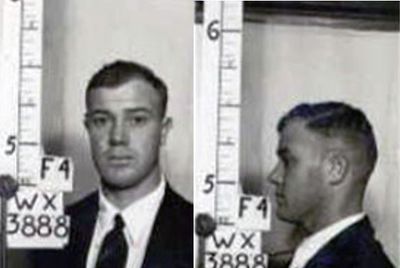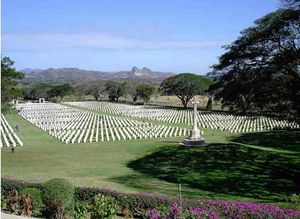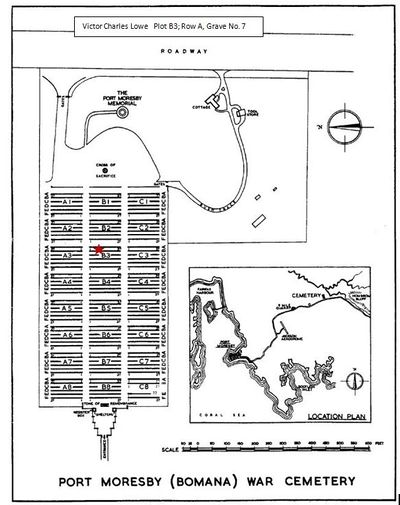Difference between revisions of "Victor Charles Lowe"
From Our Contribution
| (4 intermediate revisions by the same user not shown) | |||
| Line 1: | Line 1: | ||
{{infobox soldier ww2 | {{infobox soldier ww2 | ||
| − | | image =[[File:Lowe_Victor_Charles_1.jpg]] | + | | image =[[File:Lowe_Victor_Charles_1.jpg|400px]] |
| caption = | | caption = | ||
| image2 = | | image2 = | ||
| Line 54: | Line 54: | ||
| monument1 = Armadale War Memorial | | monument1 = Armadale War Memorial | ||
| monumentnote1 = | | monumentnote1 = | ||
| − | | monument2 = | + | | monument2 = [[WA State War Memorial]] |
| monumentnote2 = | | monumentnote2 = | ||
| monument3 = | | monument3 = | ||
| Line 116: | Line 116: | ||
[[Category:Blacksmith ww2]] | [[Category:Blacksmith ww2]] | ||
[[Category:Church of England ww2]] | [[Category:Church of England ww2]] | ||
| − | |||
[[Category:Deaths ww2]] | [[Category:Deaths ww2]] | ||
[[Category:1942 Deaths ww2|*]] | [[Category:1942 Deaths ww2|*]] | ||
Latest revision as of 15:51, 11 December 2023
 | |
| Personal Information | |
|---|---|
| Date of Birth | 17 Apr 1913 |
| Place of Birth | Victoria |
| Death | 8 Sep 1942 |
| Place of Death | Mission Ridge, Kokoda Track, Papua |
| Age at Enlistment | 27 years, 1 month |
| Occupation | Blacksmith |
| Religion | Church of England |
| Address | Armadale, Western Australia |
| Next of Kin | Wife , Mrs Nellie Hilda Lowe |
| Military Information | |
| Reg Number | WX3888 |
| Date of Enlistment | 1 Jun 1940 |
| Rank | Lance Corporal |
| Unit/Formation | 2/16th Australian Infantry Battalion |
| Military Movement | |
| 1st Departure from Australia | |
| Journey Dates | 26 Oct 1940 ‒ 4 Nov 1940 |
| Transport Details | HMT Aquitania Convoy US6 Fremantle to Bombay |
| Transfers | |
| Journey Dates | 12 Nov 1940 ‒ 22 Nov 1940 |
| Transport Details | HMT Rajula Convoy BN 8.5 Bombay to El Kantara, Egypt |
| Return to Australia | |
| Journey Dates | 29 Jan 1942 ‒ 6 Feb 1942 |
| Transport Details | SS Île de France Convoy JS3 Port Tewfik to Bombay |
| Journey Dates | 9 Feb 1942 ‒ 15 Mar 1942 |
| Transport Details | SS Kosciusko Convoy SU 1 Bombay to Adelaide |
| 2nd Departure from Australia | |
| Journey Dates | 6 Aug 1942 ‒ 13 Aug 1942 |
| Transport Details | SS James Fenimore Cooper Brisbane to Port Moresby |
| Post War Details | |
| Fate | KIA 8 Sep 1942 Kokoda Track |
| Monument(s) |
Armadale War Memorial WA State War Memorial |
| Australian War Memorial | Australian War Memorial |
| Medals |
1939-45 Star Africa Star Pacific Star War Medal 1939-45 Australian Service Medal 1939-45 |
Pre War
War Service
Enlisted on 1 Jun 1940 and was sent to the Northam camp, where he was granted leave without pay from 1 - 17 Jun 1940 inclusive, after which he reported to the 2/16th Battalion. He was granted convalescent leave from 19 - 24 Jul 1940, and pre-embarkation leave from 27 Sep until 4 Oct 1940. No other details of his early training are in his records.
On 25 Oct 1940 he embarked on the HMT Aquitania for the Middle East, disembarking in Bombay, India on 4 Nov 1940. Transported to camps, they remained ashore for up to 5 days before boarding much smaller ships for Kantara in Egypt. The records for all members of the 2/16th Battalion only record embarkation and disembarkation, no names of ships are provided, nor mention of their transfer in Bombay. On 25 Nov 1940 the majority arrived at Kantara on one of the following four steamers: Christian Huygens, Lancashire, Dilwarra and Rhona.[1] .Howevert, individual records for some indicate they travelled on HMT Rajula in convoy BN 8.5 from Bombay to El Kantara, Egypt.
Following their arrival they boarded a train for Gaza in Palestine to complete their training. Their initial role was to bolster the defences along the Libya-Egypt border against an expected German attack. Transferred to Palestine, the 2/16th Battalion participated in an attack on well entrenched Vichy French positions on 8 Jun 1941. They took heavier casualties than any other Australian unit (264), and remained after the local Armistice as part of the garrison force. On 31 Jul 1941 Victor was evacuated to the 2/1st Australian General Hospital with an infection, passed to the 2/7th Australian General Hospital on 1 Aug 1941 and he was released to the 21st Australian Infantry Training Battalion on 5 Aug 1941, and to his unit on 15 Aug 1941. On 8 Sep 1941 he was charged with Conduct to the prejudice of Good order and Military Discipline, and was awarded 3 days Confined to Barracks.
On 29 Jan 1942 he embarked on SS Île de France a part of Convoy JS3, for Bombay. where they disembarked on 6 Feb 1942 and were sent to camps to await their embarkation on smaller , slower ships in the convoy that would carry them to Singapore. Clarence was allocated to the SS Kosciusko. The convoy set out for Singapore on 9 Feb 1942, and refuelled at Colombo. When Singapore surrendered on 15 Feb 1942 the slow moving convoy was approaching the Sunda Straits, and given that the Japanese had already landed on many of the Dutch East Indian islands (Indonesia), the convoy's destination was changed on the orders of Churchill to Rangoon, Burma to assist with its defence. Curtin, however, was determined to bring every possible soldier home to defend Australia and demanded that the convoy, now redesignated as Convoy SU1, turn around and sail for Australian ports. On 25 Feb 1942 the convoy again refueled in Colombo, leaving there on 1 Mar 1942 for Fremantle which it reached on 15 Mar 1942. Around 350 of the members of the 2nd/16th Battalion from the SS Kosciusko failed to re-board when the convoy sailed for Port Adelaide. Those who missed their boat were sent to Adelaide by train.[2].
Along with more than 350 others Victor disembarked in Perth and was AWOL from 1:00pm on 18 Mar until 9:30 am on 23 Mar 1942. Penalty was a fine of £5 and loss of 5 days pay. On 28 Mar 1942 he embarked on the USAT Monterey for Adelaide where he disembarked on 31 Mar 1942. The battalion relocated to Queensland for some Jungle training and on 6 Aug 1942 embarked in Brisbane on the SS James Fenimore Cooper for Port Moresby, disembarking on 13 Aug 1942.
Quickly pushed into action to help stop the Japanese attack up the Kokoda Track, they saw action for he first time in Papua on 29 Aug 1942 at Abuari. Forced to withdraw, the 2/16th fought a series of desperate actions back along the Trail. It suffered particularly heavily at Mission Ridge on 8 Sep 1942 when it had to fight its way out of a Japanese encirclement. Victor was posted as missing after they extracted themselves from Mission Ridge, and on 21 Oct 1942 this was changed to Killed in Action on 8 Sep 1942 at Brigade Hill.

